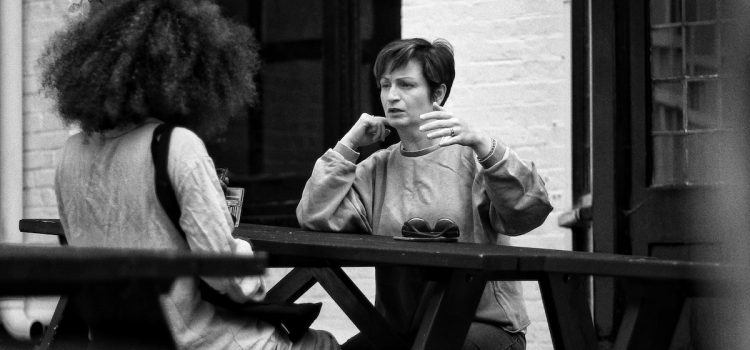

This article is an excerpt from the Shortform book guide to "Year of Yes" by Shonda Rhimes. Shortform has the world's best summaries and analyses of books you should be reading.
Like this article? Sign up for a free trial here.
Are you an introvert who has something to say? How can you make yourself heard?
Communicating your ideas can be hard if you’re an introvert with strong opinions. Luckily, Shonda Rhimes is the same way, and she explains how to speak loud and clear in her book Year of Yes.
Learn how to make yourself heard among all the extroverts in the room.
Make Yourself Seen and Heard
Rhimes describes herself as highly introverted and shy, making fame a difficult adjustment for her personality. But she realized that hiding herself from the world and letting her introverted personality and social anxiety dictate her life was not making her happy. To improve how she felt, she knew she must commit to being seen and heard by others, even though it was uncomfortable. She discovered the more she pushed through anxiety, accepted compliments, and walked with her well-earned swagger, the more comfortable she grew with being seen and heard, and she began to feel like her authentic self.
(Shortform note: Rhimes describes herself as a naturally introverted and shy person, two characteristics that are often confused with one another but are not the same. In Quiet: The Power of Introverts, Susan Cain explains that introverted people are often stereotyped as shy, but not all introverts are shy. Introversion is about feeling overstimulated and drained by social interactions, while shyness is more about fear of embarrassing social interactions. Being shy doesn’t necessarily mean you have social anxiety, however. Shyness and social anxiety share characteristics like fear of embarrassment and nervousness about social interactions, but social anxiety’s symptoms tend to be much worse and cause more disruption to your life.)
Here are Rhimes tips for making yourself heard.
1. Don’t Shy Away From the Public Eye
Before her transformative year, being seen and heard in public had caused Rhimes severe panic attacks because she was afraid of being judged by others. She often passed up opportunities for events that would put her in the public eye, like interviews, because she was uncomfortable with that level of visibility. When she had to make public appearances, she kept her guard up and refrained from being vulnerable and showing her authentic self.
(Shortform: Rhimes doesn’t explicitly explore the root cause of her fear of vulnerability, but in Daring Greatly, Brene Brown explains that shame, self-doubt, and low self-worth are often the sources of our fear of being vulnerable with others. Brown contends that overcoming your aversion to vulnerability can help you feel more courageous, have more connection in your life, and feel more compassion toward yourself and others, as Rhimes did.)
As a part of Rhimes’s experiment to face her fears, she decided to say “yes” to every invitation, and she accepted two opportunities she might otherwise have declined: a guest appearance on the Jimmy Kimmel Show and an invitation to deliver a graduation speech at her alma mater, Dartmouth. These events allowed her to face her social anxiety head-on, and she discovered that being vulnerable in public can be scary but also gratifying and fun.
2. Accept Praise and Compliments
During an award ceremony for women leaders in entertainment, Rhimes realized how uncomfortable she was receiving praise. She further realized that this reaction is common for women: Even powerful women like herself can’t easily accept praise and compliments because women are taught to make excuses for their gifts and successes in American society instead of gladly taking credit for them.
Rhimes decided to practice accepting praise without apologizing or explaining her accomplishments and gifts away. She learned that accepting compliments is a gift she can give herself and the person giving the compliment—it felt great to absorb other people’s positive feedback, and it made her feel more connected to others.
3. You’re a Badass. Don’t Hide It
As Rhimes got more comfortable accepting praise, she noticed a positive shift in how she felt about her gifts and successes. She realized that she had been making her voice and presence smaller and quieter to make others more comfortable. Because of this realization, she committed to speaking up more, being candid, and displaying her personal power. Doing so liberated her to be herself around others, in all her glory, without shame.
Rhimes practiced embodying what she calls “badassery”—the practice of knowing your accomplishments and gifts and celebrating them. Acknowledging her badassery transformed her relationships—she could now appreciate everyone else’s contributions more because she wasn’t wasting her energy hiding.
(Shortform note: Knowing, owning, and celebrating your accomplishments, strengths, and gifts (what Rhimes calls badassery) is just one of the many tips Katie Kay and Claire Shipman outline in The Confidence Code for building more confidence in yourself. They also recommend taking action even when you’re uncertain and not taking criticism of your performance personally—be open to feedback and view it as something helpful.)

———End of Preview———
Like what you just read? Read the rest of the world's best book summary and analysis of Shonda Rhimes's "Year of Yes" at Shortform.
Here's what you'll find in our full Year of Yes summary:
- The story of a woman who said "yes" to every opportunity for a year
- How to go from surviving to full-hearted thriving
- Why you shouldn't be uncomfortable with receiving praise






